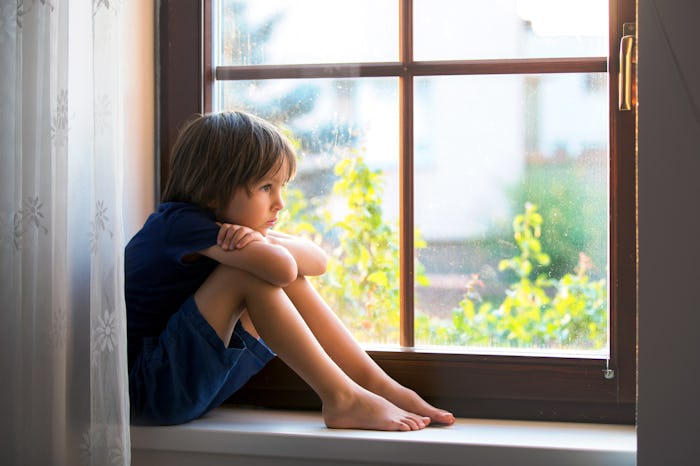Life
9 Little Habits That Could Be Signs Of Anxiety Or Depression In Kids
Kids can express a plethora of scary or worrisome behavior, so it may seem difficult to differentiate which signs are red flags and signal that you need to pay closer attention. There are, however, little habits that are subtle signs of anxiety or depression in kids that you don't even realize, that can help you differentiate whether your child is just going through a phase, or showing signs of general unhappiness. Knowing the signs of depression or anxiety can give you some peace of mind and help you get the help your little one needs to deal with his struggles.
According to Parenting, "[The American Academy of Child and Adolescent Psychiatry] (AACAP) estimates that as many as one in 20 children and adolescents is depressed." Keep in mind a struggle with sadness or anxiety from an isolated situation that warrants it doesn't automatically mean you need to worry about anxiety or depression. Instead, observe signs and behaviors over time. If they persist, and start to interrupt everyday activities, friendships, or family life, they could point to a bigger struggle.
Knowing the signs is key to early intervention, especially considering that treatments for childhood depression and anxiety are much more complex, according to Parenting. Additionally, children with depression often deal with other problems, like anxiety, conduct disorders, and more, according to Baby Center's interview with chief psychologist Nadine J. Kaslow. So, if you notice some of the signs here continue over time or seem to compound other problems, reach out to your healthcare provider to figure out your next steps.
1Unusual Anger
One of the top symptoms of depression or anxiety in kids includes anger or irritability, according to WebMD. Although occasional outbursts or frustration doesn’t mean your kid is suffering from depression or anxiety, it may be something to address if you notice a constant or unusual struggle with aggression or frustration.
2Overly Tired
Adolescent psychiatrist Dr. Elizabeth Rody told Psych Central that toddlers who are depressed are persistently irritable, withdrawn, and lethargic. This means that chronic fatigue or long-lasting lack of energy can be a sign of depression in kids.
3Frequent Sadness
If your child is upset or crying more often than usual or for weeks on end, and if symptoms interfere with the ability to function, the aforementioned BabyCenter article suggested seeking help. Although tantrums and tears isn’t out of the norm, a major shift in personality can cause concern.
4Loss Of Interest
The aforementioned WebMD article said that some children may function well in structured environments, but sometimes kids with major depression or anxiety will suffer a noticeable change in social or other activities, especially loss of interest or unwillingness to participate.
5Loss Of Appetite
According to Kids Health, depression and anxiety can interfere with appetite and eating habits. Depression, especially, can cause kids to loss interest in eating or to just simply not feel hungry for seemingly no reason.
6Severely Sensitive
The Washington Post shared that extreme sensitivity to rejection or failure may point to depression in kids. If you notice a sudden shift or ongoing sensitivity from your little one's normal activities, talk to your doctor about assessing the situation.
7Always Feeling Sick
A common sign of toddler or adolescent depression is pain or complaints that something constantly hurts, according to Everyday Health. Symptoms like chronic headache, stomach ache, or even digestion problems without a logical explanation or cause could mean depression and anxiety is looming.
8Harmful Tendencies Towards Self Or Others
Psych Central shared that if a child starts participating in play that involves self harm or harm to others it's sometimes a sign that your kid could suffer with depression.
9Other Disorders
Signs of anxiety can also come in other forms, according to Kids Health. For example, if your kid displays symptoms of obsessive compulsive disorder, phobias, and panic attacks, those are strong signs they're dealing with anxiety.
Check out Romper's new video series, Romper's Doula Diaries:
Watch full episodes of Romper's Doula Diaries on Facebook Watch.
